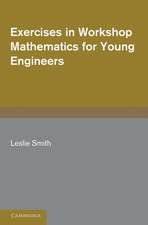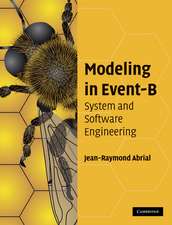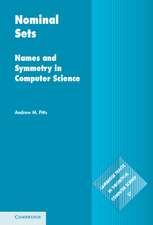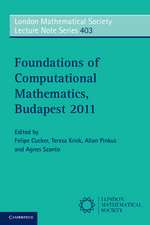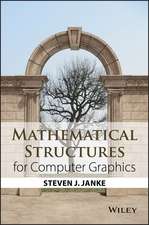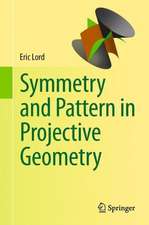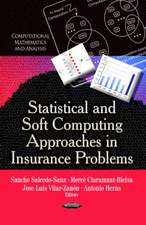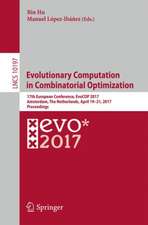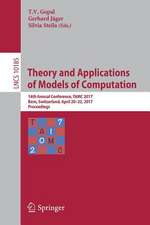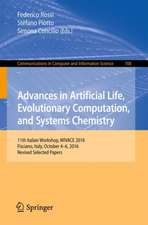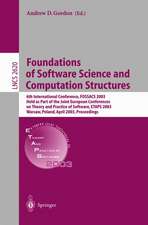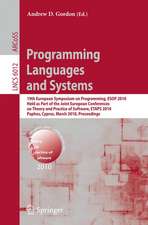Higher Order Operational Techniques in Semantics: Publications of the Newton Institute, cartea 12
Editat de Andrew D. Gordon, Andrew M. Pittsen Limba Engleză Hardback – 21 ian 1998
Din seria Publications of the Newton Institute
-
 Preț: 448.86 lei
Preț: 448.86 lei - 14%
 Preț: 1076.30 lei
Preț: 1076.30 lei - 11%
 Preț: 425.94 lei
Preț: 425.94 lei - 11%
 Preț: 430.94 lei
Preț: 430.94 lei - 20%
 Preț: 303.67 lei
Preț: 303.67 lei - 14%
 Preț: 1488.13 lei
Preț: 1488.13 lei - 14%
 Preț: 789.17 lei
Preț: 789.17 lei - 20%
 Preț: 327.13 lei
Preț: 327.13 lei -
 Preț: 430.14 lei
Preț: 430.14 lei -
 Preț: 429.67 lei
Preț: 429.67 lei -
 Preț: 403.44 lei
Preț: 403.44 lei - 20%
 Preț: 773.34 lei
Preț: 773.34 lei - 11%
 Preț: 486.85 lei
Preț: 486.85 lei - 11%
 Preț: 490.59 lei
Preț: 490.59 lei - 11%
 Preț: 491.66 lei
Preț: 491.66 lei - 14%
 Preț: 794.45 lei
Preț: 794.45 lei - 14%
 Preț: 1147.20 lei
Preț: 1147.20 lei
Preț: 644.44 lei
Preț vechi: 805.55 lei
-20% Nou
Puncte Express: 967
Preț estimativ în valută:
123.35€ • 134.03$ • 103.68£
123.35€ • 134.03$ • 103.68£
Carte tipărită la comandă
Livrare economică 21 aprilie-05 mai
Preluare comenzi: 021 569.72.76
Specificații
ISBN-13: 9780521631686
ISBN-10: 0521631688
Pagini: 400
Dimensiuni: 157 x 236 x 25 mm
Greutate: 0.75 kg
Ediția:New.
Editura: Cambridge University Press
Colecția Cambridge University Press
Seria Publications of the Newton Institute
Locul publicării:Cambridge, United Kingdom
ISBN-10: 0521631688
Pagini: 400
Dimensiuni: 157 x 236 x 25 mm
Greutate: 0.75 kg
Ediția:New.
Editura: Cambridge University Press
Colecția Cambridge University Press
Seria Publications of the Newton Institute
Locul publicării:Cambridge, United Kingdom
Cuprins
Introduction; 1. Operational reasoning about primitive objects A. Gordon; 2. Semantics for core concurrent ML with computation types A. Jeffrey; 3. Relational reasoning about contexts S. B. Lassen; 4. Labelling techniques and typed fixed-point operators J. Mitchell, M. Hoang and B. T. Howard; 5. Semantics of memory management for plymorphic languages G. Morrisett and R. Harper; 6. Operational reasoning for functional languages with local state A. Pitts, I. Stark; 7. Improvement theory and its applications D. Sands; 8. The coverage of operational semantics S. F. Smith; 9. Reasoning about functions with effects C. Talcott.
Descriere
A 1998 collection of original articles by leading researchers in area of programming languages.
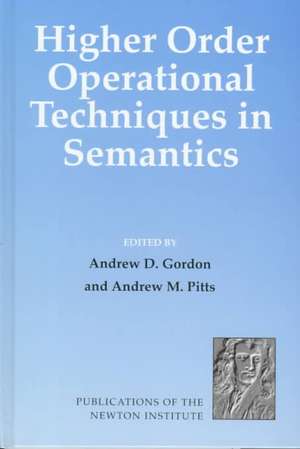


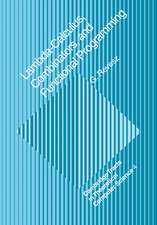
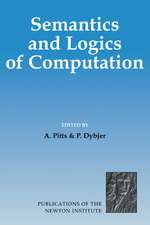
![Revised [6] Report on the Algorithmic Language Scheme](https://i4.books-express.ro/bt/9780521193993/revised-6-report-on-the-algorithmic-language-scheme.jpg)
